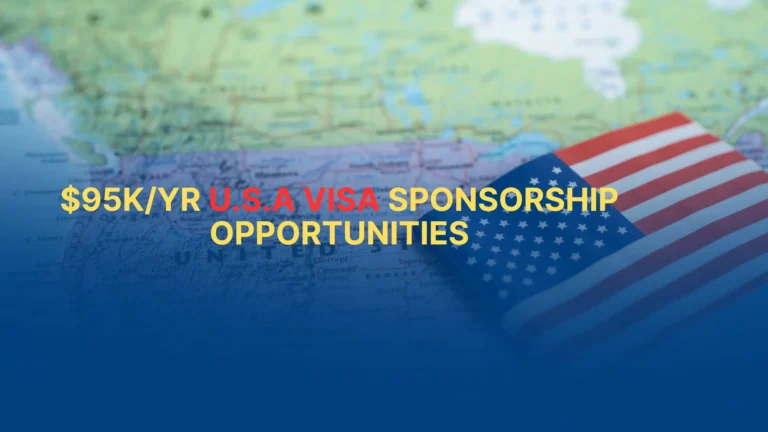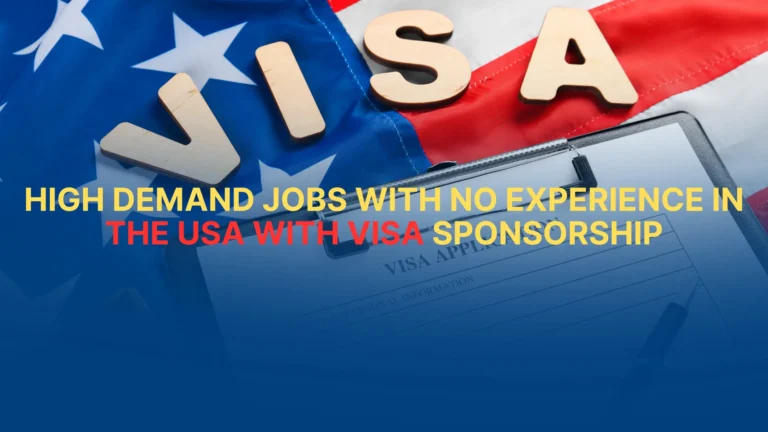Pharmacist Jobs in Germany 2025 | High-Paying €75,000+ Salary with Visa Sponsorship
Germany has established itself as one of the most attractive destinations in Europe for professionals seeking long-term employment, especially in healthcare. With a growing demand for qualified pharmaceutical professionals, pharmacist jobs in Germany in 2025 are now offering lucrative salary packages—frequently exceeding €75,000 annually—along with visa sponsorship for eligible foreign nationals.
The country’s healthcare infrastructure, pharmaceutical advancements, and acute need for skilled labor make it an appealing choice for pharmacy professionals who want to build a stable and financially rewarding career abroad.
Many international pharmacy graduates and experienced pharmacists are looking toward Germany as a preferred country for employment, not just because of the high salary but also due to its work-life balance, legal job protections, and family-friendly immigration policies.
The German pharmaceutical industry plays a crucial role in Europe’s drug development and distribution network. As a result, the country continues to attract multinational pharmaceutical corporations and expand its local pharmaceutical production.
The German government has put in place several visa options that simplify the hiring of skilled professionals, especially in healthcare roles. With pharmacist positions being classified under the skill shortage category, foreign applicants stand a much higher chance of receiving employer sponsorships and quicker visa approvals.
Unlike some other EU countries, Germany does not require overly complex licensing transitions for pharmacists trained abroad, making it a relatively accessible destination for pharmacists from countries such as India, the Philippines, Nigeria, Pakistan, and others with solid academic backgrounds.
With the promise of stable employment, access to advanced pharmaceutical systems, and immigration support through visa sponsorship, Germany has become a top-tier destination for pharmacists aiming to work internationally.
The rest of this article will break down the key reasons to consider a pharmacy career in Germany, the types of roles available, regions with better salary offers, and how to secure one of these high-paying jobs legally and successfully in 2025.
Why Work in the Pharmacy Industry?
Working in the pharmacy industry offers long-term career stability, competitive pay, and the opportunity to contribute to public health and safety. In Germany, the pharmaceutical industry is not only respected but also one of the most critical sectors of the economy.
The nation is a leading pharmaceutical hub within the European Union, home to major global companies like Bayer, Boehringer Ingelheim, and Merck Group. This creates abundant job opportunities for licensed pharmacists, clinical researchers, production specialists, and regulatory affairs professionals.
Pharmacists in Germany benefit from structured career growth and professional development pathways. Once employed, there are numerous chances to upskill, specialize in areas like oncology or geriatrics, and participate in EU-wide research initiatives.
Compared to other industries, pharmacy jobs in Germany come with comprehensive employment contracts that include paid leave, health insurance, pension schemes, and maternity/paternity support.
Another significant benefit is job security. Due to Germany’s aging population and the continuous development of new drugs, there is a persistent need for pharmacists across retail chains, hospitals, pharmaceutical manufacturing plants, and clinical trial organizations.
This demand is not expected to slow down anytime soon, making 2025 an ideal year for foreign pharmacists to pursue these opportunities, especially those who meet the licensing and visa eligibility requirements.
Additionally, the German pharmacy sector complies with international quality standards, offering professionals a chance to work in highly regulated, modern environments. The exposure pharmacists receive here often enhances their global employability, allowing for future career options in other European countries or even North America.
For those aiming to settle in Europe permanently, a pharmacist role in Germany offers a reliable path to long-term residence and even citizenship, given the high integration support and legal work permits available.
Whether you’re looking to start fresh or advance an existing career, the pharmacy sector in Germany presents a balanced mix of purpose-driven work and financial reward. Given the country’s welcoming stance towards skilled foreign workers, pharmacy professionals now have one of the best opportunities in years to secure a stable, well-paying job with visa sponsorship included.
Types of Pharmacist Jobs in Germany with Visa Sponsorship
Germany’s pharmacy job market offers diverse employment opportunities across clinical, commercial, and industrial sectors. These roles are not only in demand but are also among the easiest to access with visa sponsorship, especially when applying from outside the EU.
Depending on qualifications and experience, foreign-trained pharmacists can apply for multiple job types that align with both entry-level and specialized career tracks.
Community pharmacist roles are among the most accessible positions for international applicants. These jobs involve working in public pharmacies (Apotheken) and offering prescription advice, medication dispensing, and patient consultation.
Germany’s retail pharmacy chains and independent outlets often sponsor qualified pharmacists due to the shortage of local professionals, particularly in smaller cities and rural areas.
Hospital pharmacists are another high-demand category. These professionals work directly with doctors and nurses to manage patient medication, ensure regulatory compliance, and maintain inventory for large-scale healthcare institutions.
Hospitals sponsored by regional or state health authorities regularly list job openings that include relocation assistance, German language training, and full visa sponsorship.
In addition to frontline pharmacy roles, there are also substantial opportunities in pharmaceutical manufacturing. Companies based in regions like Hesse, Bavaria, and Baden-Württemberg often look for pharmacists to manage production lines, oversee quality assurance, or contribute to drug development processes. These positions not only offer higher salaries but also additional benefits such as annual performance bonuses and advanced training programs.
For those inclined toward research, regulatory affairs, or pharmacovigilance, multinational pharmaceutical corporations in Germany recruit talent for internal departments that deal with compliance, scientific documentation, and new product evaluation. These positions usually require previous experience or postgraduate specialization but offer one of the fastest tracks to permanent residency through visa sponsorship.
Foreign pharmacists should note that while many roles require fluency in German, especially those involving direct patient contact, there are also many international employers who operate in English or provide initial language support.
The key is identifying employers that explicitly mention visa sponsorship and are registered under Germany’s skilled worker hiring program. These employers are allowed to hire talent from outside the EU without lengthy labor market testing, thus fast-tracking employment for pharmacists with strong academic and professional credentials.
Entry-level Skills and Experience Required
Although Germany has streamlined its pathways for foreign-trained pharmacists, certain baseline qualifications and skills remain mandatory to secure pharmacist jobs in 2025. First, applicants must have a recognized pharmacy degree, typically equivalent to a Master’s-level qualification in Germany.
Degrees earned in countries like the UK, Canada, Australia, and India are usually eligible, but candidates must go through an equivalency evaluation conducted by the German authority known as the “Approbationsbehörde.”
Aside from academic qualifications, pharmacists must demonstrate sufficient knowledge of pharmaceutical law, drug safety protocols, and pharmacology, particularly as practiced under EU standards.
Some roles require passing the Fachsprachenprüfung (technical language test) and the Kenntnisprüfung (knowledge assessment exam) before full licensure is granted. However, for many entry-level roles, especially under supervised conditions or in private sectors, partial licensing or supervised practice may be allowed while working under an approved employer with visa sponsorship.
Language skills are increasingly important. Most community and hospital pharmacist roles require a B2-level proficiency in German.
However, industrial and research-based roles may allow candidates to start with limited German skills, especially if English is the main working language. Some employers even include language training as part of their visa sponsorship package to ensure the candidate transitions smoothly into the local environment.
Experience is another crucial aspect. While entry-level jobs are available for fresh graduates, candidates with one to two years of clinical, academic, or industrial pharmacy experience have a clear advantage.
Prior internships or hospital rotations count, especially if they involve direct patient interaction, prescription handling, or regulatory documentation. Specialized certifications in areas such as pharmacovigilance, oncology, or drug formulation can further increase job eligibility.
Soft skills such as attention to detail, communication abilities, and adaptability to regulatory frameworks are also evaluated by German employers. In most visa-sponsored applications, employers look for candidates who can demonstrate professionalism and cultural adaptability. This is why references, well-crafted CVs, and a clear intent to work and live in Germany matter during the selection process.
Overall, international pharmacists looking for visa-sponsored jobs in Germany in 2025 must ensure that their qualifications are recognized, their language skills meet minimum levels, and they are willing to go through any required assessments or training to secure long-term employment.
Regions with the Highest Payment Structures
In Germany, pharmacist salaries vary significantly depending on the region, type of employer, and level of experience. While the national average salary for pharmacists is impressive, certain federal states consistently offer higher income levels due to regional demand, cost of living, and availability of skilled labor. Foreign applicants seeking jobs with visa sponsorship should target these regions for better earnings and career advancement.
Baden-Württemberg, home to cities like Stuttgart, Heidelberg, and Ulm, leads the list with some of the most competitive salaries for pharmacists. This region hosts numerous pharmaceutical manufacturing giants and research institutions, offering roles that pay above €80,000 annually, especially for pharmacists involved in industrial or R&D positions.
Employers here often support relocation and visa sponsorship due to talent shortages in advanced pharmaceutical sectors.
Bavaria, particularly the city of Munich, also stands out for high-paying pharmacist jobs. As a hub for biotechnology and pharmaceutical companies, the demand for clinical and production pharmacists is high.
Salaries often range from €75,000 to €90,000 annually, with added benefits such as housing assistance and relocation bonuses. Munich also has several international employers that sponsor skilled workers directly through Germany’s Skilled Immigration Act, making it easier for foreign pharmacists to get hired.
North Rhine-Westphalia, the most populous state, has consistent demand across community pharmacies, hospitals, and private clinics.
Cities like Düsseldorf, Cologne, and Bonn offer salaries between €70,000 and €85,000, depending on the specific role and level of experience. Given the size of the healthcare sector in this region, pharmacists also have access to a larger network of professional development programs.
Lower Saxony and Hesse also offer attractive opportunities, especially in smaller towns where labor shortages drive up wages and improve sponsorship chances.
Frankfurt, the financial center of Germany, located in Hesse, has a growing pharmaceutical market that supports high-paying jobs in clinical research and pharmaceutical compliance, often exceeding the €85,000 threshold for experienced professionals.
It’s also important to consider rural regions where pharmacist shortages are more acute. These areas may offer lower living costs and additional government support for foreign hires, such as tax incentives and settlement assistance, while still maintaining competitive salaries. Employers in these regions are more likely to sponsor visas quickly due to urgent hiring needs.
For international pharmacists exploring employment in Germany, targeting these top-paying regions can significantly impact long-term earnings and job security. Aligning career goals with regional demand and employer offerings is crucial for securing the best visa-sponsored pharmacist positions available in 2025.
Salary Expectations for Pharmacists
In Germany, pharmacist salaries are highly competitive, particularly for skilled professionals who meet the licensing and language requirements. The base salary for newly licensed pharmacists typically starts around €50,000 annually, but that figure can climb rapidly with experience, location, specialization, and the type of employer.
By 2025, salary expectations for pharmacists—especially those in full-time roles with visa sponsorship—are generally positioned between €65,000 and €90,000 per year, with potential for bonuses and benefits that significantly increase total compensation.
Community pharmacists, who work in public pharmacies, generally earn between €50,000 and €70,000 annually. These salaries depend on whether the pharmacy is part of a large chain or an independent operation. In rural areas where pharmacist shortages are common, community pharmacists may be offered higher salaries and faster visa processing to encourage relocation.
Although these roles may not offer the highest base salary, they often include housing support, flexible work schedules, and language training—especially important for foreign workers adjusting to the German system.
Hospital pharmacists typically earn more, with average salaries starting at €65,000 and reaching over €80,000 annually after a few years of experience. Hospitals often offer structured pay scales based on public sector wage agreements, such as the “TVöD” (Tarifvertrag für den öffentlichen Dienst), which ensure regular salary increases and job security.
Hospital roles also provide foreign pharmacists with easier pathways to full licensure, as they often support the candidate through equivalency testing and professional development programs.
Pharmacists working in the pharmaceutical industry, particularly those involved in quality assurance, regulatory affairs, and clinical trials, often command the highest salaries. These roles can start around €75,000 and stretch upwards to €100,000 for senior-level specialists.
These positions are frequently based in cities with pharmaceutical hubs such as Frankfurt, Munich, and Hamburg, and commonly include performance-related bonuses, stock options, and company-sponsored training programs. Employers in these sectors are also more likely to offer visa sponsorship packages that include relocation assistance for foreign professionals.
The salary for part-time and contract roles can vary, but even these positions offer competitive hourly rates that align with German labor laws. Some employers also provide benefits such as child care support, transport allowances, and generous paid leave schemes that further enhance the overall compensation package.
It’s also worth noting that tax rates in Germany are progressive, meaning higher salaries are subject to higher income tax. However, social contributions such as health insurance, pension, and unemployment insurance are included in the employment package, ensuring that pharmacists enjoy a strong social safety net.
Visa-sponsored roles usually include detailed employment contracts that clarify gross vs. net salary, ensuring transparency for foreign workers unfamiliar with German taxation.
In conclusion, pharmacist jobs in Germany in 2025 offer not only high starting salaries but also long-term financial stability. When combined with the potential for visa sponsorship, full benefits, and long-term career progression, these roles present one of the most attractive healthcare career paths for international professionals considering employment in Europe.
Visa Types and Options for Pharmacists
Foreign-trained pharmacists seeking to work in Germany in 2025 can access several legal immigration pathways that facilitate visa sponsorship. As Germany continues to face shortages in critical healthcare roles, including pharmacy, the government has created simplified visa routes designed to bring skilled workers into the country quickly and legally. For pharmacists, the two most common visa types are the Skilled Worker Visa (Fachkräftezuwanderungsgesetz) and the EU Blue Card.
The Skilled Worker Visa is available to non-EU citizens with recognized professional qualifications. To qualify, applicants must secure a job offer from a German employer and have their educational credentials officially recognized as equivalent to German standards.
Pharmacists applying under this route will often be supported by their employer through the recognition process. Employers who are recognized as “certified sponsors” can fast-track the visa application and reduce bureaucratic delays. This visa allows the applicant to live and work in Germany for an initial period of up to four years, with the option to apply for permanent residency afterward.
The EU Blue Card is another excellent option, particularly for pharmacists with university degrees and job offers that meet a minimum annual salary threshold—around €45,000 in most healthcare-related roles.
The EU Blue Card offers a simplified path to permanent residency and allows the holder to bring family members under family reunification rules. Many international pharmaceutical companies and hospitals prefer hiring through the Blue Card route due to its streamlined process and legal flexibility.
In some cases, pharmacists may also qualify for a Job Seeker Visa, which allows them to enter Germany for up to six months to search for employment. However, this visa does not allow immediate employment and is not the preferred path for most healthcare professionals, as it requires applicants to support themselves without income during the job search period.
Once in Germany, visa holders can apply for a residence permit that is specifically tied to their professional role. This is commonly referred to as a “Residence Permit for the Pursuit of Qualified Employment” and is renewable. If a pharmacist changes employers or locations, the permit can be updated accordingly, provided the new role still meets the original qualification criteria.
Additionally, foreign-trained pharmacists must begin the professional licensing process upon arrival. This includes the Approbation (full license) or Berufserlaubnis (temporary license). Many visa-sponsored roles will support applicants during this transition phase, offering conditional employment while awaiting full licensure.
As part of the visa process, proof of sufficient German language skills (typically B2 level) is often required unless the role is in an international or English-speaking environment.
Visa sponsorship for pharmacists often includes more than just legal documentation. Employers usually assist with housing, language classes, integration courses, and even help for dependents such as school enrollment for children or work authorization for spouses. These support services make the transition smoother and contribute to higher retention rates among foreign pharmacy professionals.
For any pharmacist seeking legal employment in Germany, understanding the available visa types and choosing the right one based on personal qualifications and employment offers is a crucial step. The German immigration system is designed to welcome skilled workers, and with the pharmacy sector in urgent need of professionals, 2025 remains a strong year for foreign pharmacists to secure both jobs and legal residency through employer sponsorship.
How to Find Pharmacist Jobs in Germany with Visa Sponsorship
Finding pharmacist jobs in Germany with visa sponsorship in 2025 requires a strategic approach that begins with identifying reputable employers and making sure all application materials meet German employment standards. As demand for pharmacists continues to rise, especially those with qualifications and language proficiency, international applicants now have access to a broader range of opportunities across hospitals, retail pharmacies, pharmaceutical companies, and research organizations.
The first step is to prepare a German-standard CV and a tailored cover letter that clearly outlines your qualifications, work experience, language proficiency, and willingness to relocate. German employers place a strong emphasis on detail and organization, so your documents should be well-structured, error-free, and professionally translated into German if needed.
Job portals are the most common and effective tools for finding openings. Trusted platforms like Make-it-in-Germany, StepStone, Jobbörse (Federal Employment Agency), and Indeed Germany feature hundreds of pharmacist job listings, many of which indicate “visa sponsorship available” in the job description.
These platforms allow filtering by region, industry, and job type, making it easier to find suitable matches. LinkedIn is another valuable platform where German recruiters actively scout for pharmacy professionals, especially those with international experience.
Recruitment agencies that specialize in healthcare placements are also a powerful resource. Agencies such as MedPharmCare, TTA Personal GmbH, and CareWithCare are licensed to connect international pharmacists with visa-sponsored employers in Germany.
These agencies often assist with credential evaluation, interview preparation, and visa paperwork, offering a full-service experience that increases your chance of success.
Another effective route is applying directly to large pharmacy chains such as DocMorris, easyApotheke, or Alliance Healthcare Deutschland, as well as hospital systems and pharmaceutical manufacturers like Bayer, Pfizer Germany, and Boehringer Ingelheim. Many of these organizations have dedicated international recruitment departments and provide comprehensive relocation support, including visa sponsorship.
Networking also plays an important role. Attending international pharmacy conferences, virtual job fairs, and connecting with alumni networks can open doors to German employers looking to hire from abroad. Some candidates also secure interviews by reaching out directly to hospital HR departments or pharmacy associations.
Finally, make sure to verify the legitimacy of the employer before accepting any job offer. Legitimate visa-sponsoring companies in Germany will issue a formal work contract and guide you through the visa and recognition process. Avoid any offer that asks for money in exchange for a job or visa processing.
By following a structured and diligent approach, foreign-trained pharmacists can secure high-paying jobs in Germany in 2025 with full visa sponsorship, setting the stage for long-term success in one of Europe’s most advanced healthcare systems.





